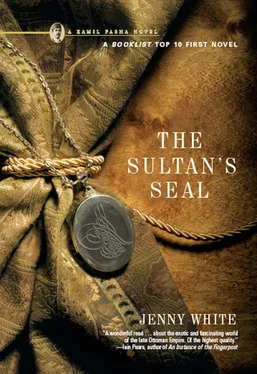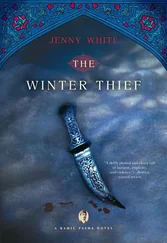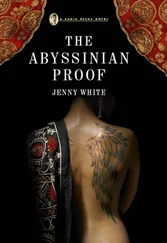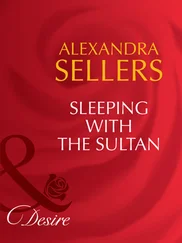Jenny White - The Sultan's seal
Здесь есть возможность читать онлайн «Jenny White - The Sultan's seal» весь текст электронной книги совершенно бесплатно (целиком полную версию без сокращений). В некоторых случаях можно слушать аудио, скачать через торрент в формате fb2 и присутствует краткое содержание. Жанр: Исторический детектив, на английском языке. Описание произведения, (предисловие) а так же отзывы посетителей доступны на портале библиотеки ЛибКат.
- Название:The Sultan's seal
- Автор:
- Жанр:
- Год:неизвестен
- ISBN:нет данных
- Рейтинг книги:5 / 5. Голосов: 1
-
Избранное:Добавить в избранное
- Отзывы:
-
Ваша оценка:
- 100
- 1
- 2
- 3
- 4
- 5
The Sultan's seal: краткое содержание, описание и аннотация
Предлагаем к чтению аннотацию, описание, краткое содержание или предисловие (зависит от того, что написал сам автор книги «The Sultan's seal»). Если вы не нашли необходимую информацию о книге — напишите в комментариях, мы постараемся отыскать её.
The Sultan's seal — читать онлайн бесплатно полную книгу (весь текст) целиком
Ниже представлен текст книги, разбитый по страницам. Система сохранения места последней прочитанной страницы, позволяет с удобством читать онлайн бесплатно книгу «The Sultan's seal», без необходимости каждый раз заново искать на чём Вы остановились. Поставьте закладку, и сможете в любой момент перейти на страницу, на которой закончили чтение.
Интервал:
Закладка:
“I brought the pendant along,” Kamil says. He takes the handkerchief with the jewelry from his jacket pocket and spreads it out on the table. “I thought since you know so many languages, you might have have some idea what these lines mean.” He opens the pendant and holds it out to Bernie. “Is it some kind of writing?”
Bernie takes the small silver globe. It rests on his palm, lobes open, like a fat insect.
“Jesus, Mary, and Joseph,” he exclaims under his breath. Freckles stand out on his blanched face like liver spots.
“What is it?” Kamil’s senses become alert for nuance.
Bernie doesn’t answer. He tilts the open silver shell toward the light and peers into it with great concentration. Kamil becomes aware of the clink of glasses and low murmur of male voices around them, the musk of tobacco smoke. The cigarettes burn down in the ashtray. Finally, Bernie closes the pendant and strokes it with his finger gently as a lover. When he looks up, he seems startled to see Kamil sitting opposite him. The surprise in his eyes is replaced by a look of consternation. He seems to be struggling with something.
He turns the pendant, examining the surface, then holds it to the light and squints to see inside again. Finally, he places it gently on the table between them. He takes a deep breath.
“It’s Chinese.”
“Chinese?” Kamil is taken aback. “Are you certain?”
“Of course. I read it fluently.”
Kamil looks at him curiously. “It’s an amazing coincidence that you should be here to decipher it for me.”
He studies the markings for a moment as if he can decipher them himself. He is thinking, however, about Bernie’s reaction.
“What does it say?”
“The two characters on the pendant stand for ‘brush’ and ‘bowstring.’”
“What?” Kamil is flabbergasted. “What does it mean? Does it mean anything at all?”
“It refers to a Chinese poem, ‘On Seeing an Early Frost.’” He recites:
In autumn wind the road is hard,
Streams fill with red leaves.
For crows what is left but stony soil and barren hills?
I can endure, a withered pine
clinging to a cliff edge,
Or set out on the road brocaded by frost.
Your brush is the bowstring that brings the wild goose down.
“You know it by heart.”
Bernie attempts to look modest. “I know a few of them. This is a poem by Chao-lin Ch’un, a concubine to a Manchu prince about a hundred years ago. Apparently, she and the prince shared a love of poetry and calligraphy. It’s said she was his political advisor, which didn’t endear her to the rest of the family. She collected art objects too, a fantastic collection, apparently. Some European travelers wrote about it. She must have been some lady.”
“What happened to her?”
“When the prince died, his son by an earlier marriage inherited his title and he kicked her out.”
“Would she have returned to her family?”
“No, women like that usually choose to become nuns-Buddhist or Taoist nuns. It gives them a lot more freedom and respect than chasing back to their parents, assuming they’d even take them back. It’s a life of contemplation, not very comfortable, but a lot of people find it rewarding. I sometimes wonder whether I wouldn’t like to try it myself.”
“I can see why it would be attractive.”
“You? Really?” He regards Kamil curiously. “I never figured you for the introspective sort. Somehow I can’t see you spending hours reflecting on the transience of plum blossoms.”
Kamil laughs. “You’d be surprised.”
“Well, friend. I respect that.”
“What about the poem?”
“The poem. Well, it’s a bitter poem. Probably written after the prince died.” Bernie takes a long swig of raki and washes it down with water. “But the last couple of lines always struck me as more of a call to action than contemplation. And I’ve always wondered about the ‘you’ in the last line, ‘your brush.’ Who was she referring to?”
“So this is what scholars of literature do,” Kamil comments with a sly smile. “Like cows eating grass. It gets chewed, digested, regurgitated, and chewed again before it becomes the cow’s food.”
Bernie lets out a guffaw that threatens to spill the drink in his hand. “And we all know what comes out at the end!” Wiping the tears from his eyes, he adds, “You should be a book critic.”
When their laughter subsides, Bernie muses, “She had a lover, a scholar named Kung, who published some fiery articles urging reform of the Manchu government. He left Peking in a big hurry the year after Chao-lin Ch’un disappeared. Reportedly went to Hang-chow. Makes you wonder, though, doesn’t it? Maybe he’s the one with the aggressive brush.” He holds up his glass. “Here’s to love and revolution.”
Kamil hesitates, then touches the rim of his glass to Bernie’s. He puts it down without sipping.
“Why revolution?”
“A few years after the two of them left Peking, there was an attempt to overthrow the Manchus. Unsuccessful. Might have nothing to do with these two, but it makes a good romantic yarn.”
“Is this poem well known?”
“Not at all. I’m not sure whether it was even published. I got hold of it as a privately circulated manuscript. Looks like someone at Dolmabahche Palace has the same manuscript, although I don’t know of any sinologists who would have been around here to translate it.”
“Why do you think the pendant came from Dolmabahche? Why not Yildiz Palace?”
Bernie appears nonplussed. “Well, that’s where most of the women are, right? They’d be the ones wearing a pendant.”
“And reading Chinese poetry?”
“Probably not. I know some of them have really good tutors, but learning Chinese is a lifetime project. Unless the sultan has a concubine from China or from the tribal peoples that border it.”
“The palace prefers Circassians, but it is possible. There’s no way to know; there are hundreds of women in the imperial household.”
Kamil reflects on the coffered ceiling. “I guess it was too much to hope that the necklace would offer some kind of clue. Perhaps someone simply had unusual taste in jewelry and it wasn’t made here at all.” He turns it over with his thumbnail. “But what about the tughra?”
Bernie’s smile does not reach his eyes, which seem fixed on a deep memory, as if the present moment were no more than thin ice. He shakes his head and faces Kamil.
“It’s an odd thing. Can’t help you there. Maybe the pendant was made somewhere else and inscribed with the Chinese characters, then found its way here and was monogrammed with the tughra. Or maybe someone at the palace was interested in Chinese poetry and had it made, then gave it to Mary as a gift.”
The tone is in the wrong key, too lighthearted. Kamil is sure Bernie is hiding something.
“It’s possible. Mary was here for almost a year. But who would know Chinese?”
Besides Bernie. Kamil frowns. He will have to find out more about his friend. The thought saddens him. Kamil rises to go, pleading an engagement.
12
The young boy tamps a golden wad of fragrant tobacco into the bowl of the old man’s narghile. As he kneels, head lowered, to attend to their water pipes, Kamil can see the whorls of his short hair, like the grain in wood, and the flanges of his ears.
Ferhat Bey waits until the boy leaves and he has taken a deep draught of fresh smoke before turning to Kamil and continuing.
“There isn’t much I can tell you. We searched the area thoroughly. There were no clues.”
Читать дальшеИнтервал:
Закладка:
Похожие книги на «The Sultan's seal»
Представляем Вашему вниманию похожие книги на «The Sultan's seal» списком для выбора. Мы отобрали схожую по названию и смыслу литературу в надежде предоставить читателям больше вариантов отыскать новые, интересные, ещё непрочитанные произведения.
Обсуждение, отзывы о книге «The Sultan's seal» и просто собственные мнения читателей. Оставьте ваши комментарии, напишите, что Вы думаете о произведении, его смысле или главных героях. Укажите что конкретно понравилось, а что нет, и почему Вы так считаете.












